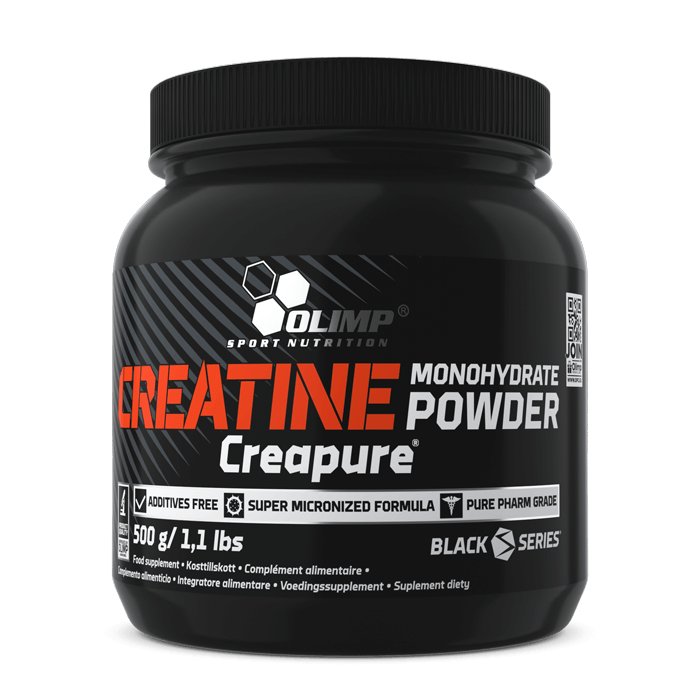Personal trainers sometimes recommend a creatine “loading phase” to rapidly maximize your muscle stores.
During this loading phase, you consume a relatively large amount of creatine in a short period to rapidly saturate your muscle creatine stores.
A common approach is to take 15-20 grams of creatine every day for a week.
This dose is usually divided into 3-4 servings throughout the day, for example; morning, afternoon, evening.
After this loading phase (if you decided to do this), continue taking 3-5 grams of creatine per day, for as long as you like.
Creatine Q&A:
Q: Is it necessary to drink more water when taking creatine?
A: No, it is not necessary to drink extra water when taking creatine, just be sure to keep hydrated. Make sure to drink at least 2.7-3.7 liters of water per day. (source: Real Muscle)
Q: Does creatine cause hair loss?
A: One study did find that creatine supplementation is associated with an increase in a hormone called DHT, which can contribute to hair loss. However, there has been no association with hair loss and creatine. (Source: Healthline)
Q: Should I cycle off creatine?
A: Science has shown there is no reason to cycle on or off of creatine. Your body’s own production of creatine will slow when you supplement creatine, but your natural levels will return to normal when you stop taking it.. (Source: Art Of Manliness)
What Is Creatine?
Creatine is the most popular supplement for improving performance in the gym.
Studies show that it is able to increase muscle mass, improve strength, and exercise performance.
It also provides a magnitude of other health benefits, such as protecting against neurological disease, for example.
However, some believe that creatine is an unsafe supplement and has side effects, but these are not supported by science and evidence.
Creatine is actually one of the most tested supplements and has an extensive safety profile.
How Creatine Works:
Creatine’s primary role is to increase the phosphocreatine stores in your muscle tissue.
These additional creatine stores can be used to produce more ATP, which is a key chemical in energy production.
Creatine also works in these ways:
- Increased workload: Enables more total volume in a training session, which is a key factor in muscle growth.
- Improved cell signaling: Creatine can increase satellite cell signaling, which plays a role during muscle repair and new muscle tissue growth.
- Reduced protein breakdown: Creatine may also reduce protein breakdown, an effect also called anti-catabolic muscle growth.
- Increased anabolic hormones: Studies note after creatine supplementation a rise in certain anabolic hormones, such as IGF-1 occurs.
- Lower myostatin levels: Reducing myostatin has been proven to increase muscle growth.
- Improved hydration: Creatine increases the water content within your muscle cells, which causes a phenomenon called cell volumization, this may also play a role in muscle growth.
Creatine Side Effects:
Creatine is one of the most well-researched supplements on the market, and there are studies lasting up to four years that reveal no negative effects of creatine. (Source: NCBI)
One of the most comprehensive studies done on creatine measured 52 blood markers and observed no adverse effects on these markers after 21 months of supplementation.
Also, there is no evidence that creatine harms the liver or kidneys in healthy people who take normal doses (3-5 grams per day).
However, those with pre-existing liver or kidney issues should talk with a doctor before supplementing with creatine.
Some people associate creatine with dehydration and cramps, however, research doesn’t support this. In fact, studies suggest creatine is able to reduce cramps and reduce dehydration during endurance exercise in high heat environments.
Types Of Creatine:
The most common and well-researched form of creatine is called creatine monohydrate.
Many other forms of creatine are available, such as;
- Creatine monohydrate
- Creatine hydrochloride
- Buffered creatine monohydrate
- Creatine magnesium chelate
- Creatine ethyl ester
- Creatine citrate
- Creatine malate
Creatine monohydrate is the cheapest, most available, and is the safest as it’s supported by hundreds of studies.
